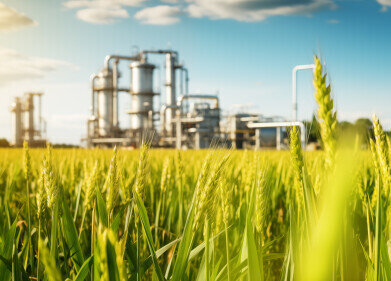Fuel for Thought
Brazil Pioneers the Rise of `Second Generation` Biofuel
Dec 20 2015
The roads of Brazil are flooded with over 36 million cars. With over 60% of vehicles running on ethanol based petrol, the environmental credentials of the country are impressive. Over the past few years, a number of innovative ‘second generation’ ethanol factories have started to use organic leftover sugarcane pulp in a bid to boost production. This has been made possible thanks to the development of an advanced new technique that turns waste into an eco-friendly plant-based biofuel.
As a plant based biofuel, ethanol is far better for the environment than its fossil fuel counterparts. A Brazilian based company called Raizen is one of the first manufacturers to pioneer the use of sugarcane pulp, hailing it as the “biofuel of the future.”
Brazil embraces biofuel
For Brazil, the rise in ethanol production represents a multitude of benefits. For starters, the country has been able to slash its greenhouse gas emissions, and will continue to do so as it makes the switch to ethanol based fuel. The use of organic waste also eases the burden on the demand for land. By reusing waste, food crops face less competition for land and water, which simultaneously opens up new doors for Brazil’s agricultural industry.
Antonio Stuchi, Raizen agro-business director explains the reasons behind its huge success. “It is a revolutionary product because you can use practically any type of biomass. That opens a big door, because everyone whose agricultural production leaves a biomass by-product, which has no use really, can turn that into ethanol.”
The future of biofuel
In fact, the company has enjoyed such a wildly positive response to its product that by 2024, it hopes to increase output by one billion litres a year. While the sugarcane pulp based ethanol is clean and green, it’s not yet quite as cost effective as it needs to be. The technology is still relatively young, which means that production isn’t as cheap as it could be. That said, Raizen is committed to advancing its product, and ensuring that it becomes the biofuel of the future. Watch this space!
Keen to know more about advancements in the biofuel industry? ‘Biofuels and their Precursors – A Challenge for Common Elemental Analyzers’ looks at the rise of alternative strategies for the production of liquid fuels, with a focus on second generation biofuels. Using high pressures and temperatures, as well as an oxygen-free atmosphere, scientists have mastered the art of transforming biogenic materials into fully functional fuels.
Image via Flickr Creative Commons. Photo credits: Rom
Digital Edition
PIN 25.1 Feb/March
March 2024
In This Edition Safety - The technology behind the ION Science Tiger XT - Safety with ammonia and LOHCs as hydrogen carriers Analytical Instrumentation - Discussion on new tribology te...
View all digital editions
Events
Apr 28 2024 Montreal, Quebec, Canada
Apr 30 2024 Birmingham, UK
May 03 2024 Seoul, South Korea
May 05 2024 Seville, Spain
May 06 2024 Riyadh, Saudi Arabia


















